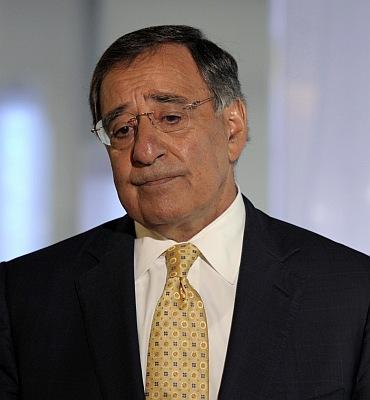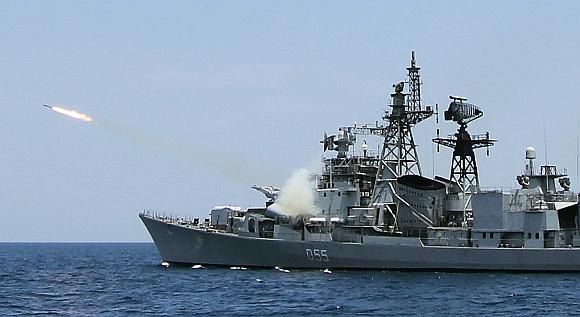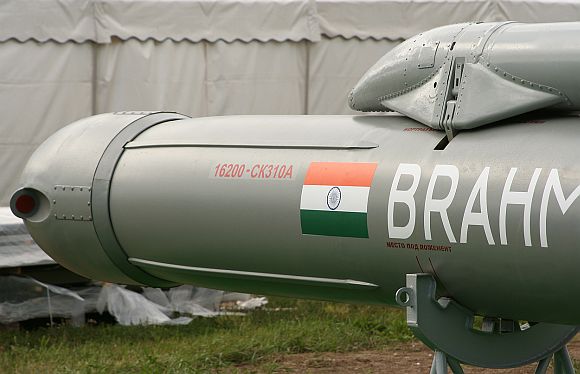 | « Back to article | Print this article |
Taking US-India defence links to the next level
India needs a helping hand and the country best placed to provide it, in every way, military, political and economic, is the US, says Premvir Das.
As many as five cabinet-level United States officials have already visited India this year, most recently US Secretary of Defence Leon Panetta. The message that they have all brought is that, for the US, India will be the major relationship of the 21st century.
Whatever this might mean to the Americans is for them to understand, but what is becoming increasingly clear is that the Indians are on a somewhat different wavelength. One of these, that India believes in freedom of passage in international waters, read South China Sea, is a position consistent with the US view.
But a different one, that it would like to see disputes in the South China Sea resolved between the parties concerned, is a position entirely consistent with what China has been advocating — much to the discomfiture of countries like Philippines, Malaysia, Vietnam, and so on, who feel that negotiating as a group gives them some leverage, unlike bilateral negotiation in which, given China's size and weight, they are certain to come out losers. So, where exactly do we stand?
Click NEXT to read further...
Panetta sees India as key to regional maritime security
For Secretary Leon Panetta, articulation is clear and precise. One, defence cooperation with India is the lynchpin of US security strategy in Asia. Two, it will help develop India's military capabilities as it shares the same values, and three, the US wants to go beyond joint military exercises and defence sales; it wishes to engage with India in joint production of defence "articles" of high technology.
Towards this end, he has directed his deputy to work on areas that come in the way of a closer engagement: to identify and eliminate red tape hindering the transfer of technology and the smooth procurement of military hardware, and to put aside the three agreements which have remained unresolved for years and devise methodologies which will promote R&D in critical military technologies. Among other things, Panetta sees India as key to regional maritime security in the Indian Ocean and a partner in ensuring that the "rules of the road" are observed by all three dimensions of the global commons, notably, at sea.
India's response to this articulation is typically Indian -- yes, but, maybe, slowly, et al. We are very good listeners and nod our heads wisely indicating that the message is being digested -- but for some strange reason, the otherwise argumentative Indians are unable to respond except in vague terms; for example, "we should move slowly".
One wonders what the visitors carry away as their assessment of our position -- vacillating, uncertain, unconcerned or just scheming. More seriously, do we remain non-committal because we are not sure of our positions or are we just unable to articulate them clearly? The truth lies somewhere in the unfathomable middle.
Click NEXT to read further...
'India falling short in developing its military strength'
India is not a small- or even middle-level country that can or should become part of any alliance in the same way as the UK, Germany, Australia or Japan can. Its power potential is not matched by the others, as also its security concerns, a long and disputed land border with China being one of them. Its relations with both the US and China have to be accommodated within this overall ambit. In essence, India does not really mind a unipolar world in which the US is the principal actor but, in Asia, it definitely needs to be a player. Yet, to get there,it needs a helping hand and the country best placed to provide it, in every way, military, political and economic, is the US.
China may be our largest trading partner but the quality of that trade bears no comparison with what we have with countries of the western hemisphere. In military technology, China lags way behind the US; politically, America is far ahead in its ability to influence the conduct of others, which is what power is all about. This scenario is unlikely to change in the foreseeable future. Our strategy should be to see how we can exploit this environment to our advantage without compromising on our goal of becoming one of the major powers in Asia as also one capable of playing a legitimate role in global affairs.
It must be conceded that several steps are already being pursued towards this end in the Asia-Pacific. Strengthening of relations with Japan is one of them; enhanced engagement with China is another. Russia is and has been a reliable friend. Add to this, successes achieved in promoting strategic interfaces with countries of South East Asia, South Korea and Australia. This is all to the good — but where we are falling short is in developing the kind of military strength that is needed to support these moves. Technology is the prime ingredient in defence capabilities. So when Panetta offers to cooperate in co-production and high-tech R&D, we should grasp the opportunity with both hands.
Click NEXT to read further...
'As India acquires strength its ability to stem pressures will increase'
The Americans have stressed more than once that this relationship will not require quid pro quos in our interactions with others, say Iran. Their most recent action, to keep India out of the sanction list on Iran, is in line with this position. Even if this is a facade, it should be possible for us to navigate our way without letting our strategic interests run aground. As we acquire more strengths, military being one of them, our ability to stem pressures will increase. In short, building the required defence capability must be an essential ingredient of our national strategy and towards this end, there is everything to be gained and little to be lost in being pro-active in defence engagement with the US.
Our military capabilities suffer from several shortcomings. The indigenous base is weak despite some achievements here and there. Defence production suffers from inefficiencies and R&D is well behind in the type of technologies that will be critically needed in the years to come. Ultimately, good navigators are those who can better read the tide, and then take it at the flood to reach their destination safely and in good time. Good sense requires that we capitalise on the opportunities on offer and turn them to our advantage.
The writer has been a member of the National Security Advisory Board
TOP photo features of the week
Click on MORE to see another set of PHOTO features...





